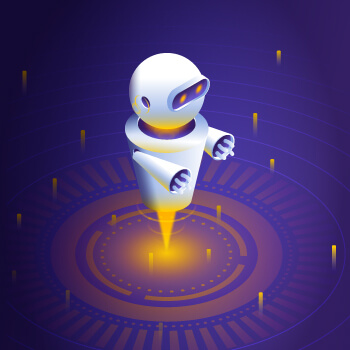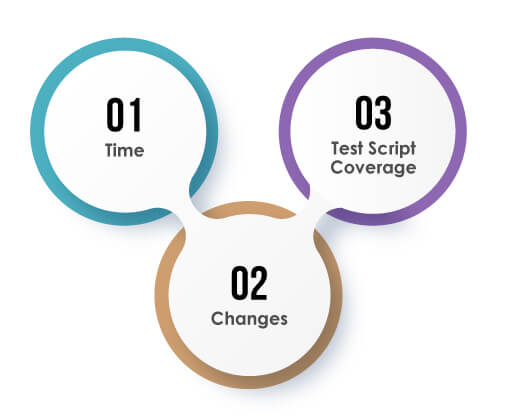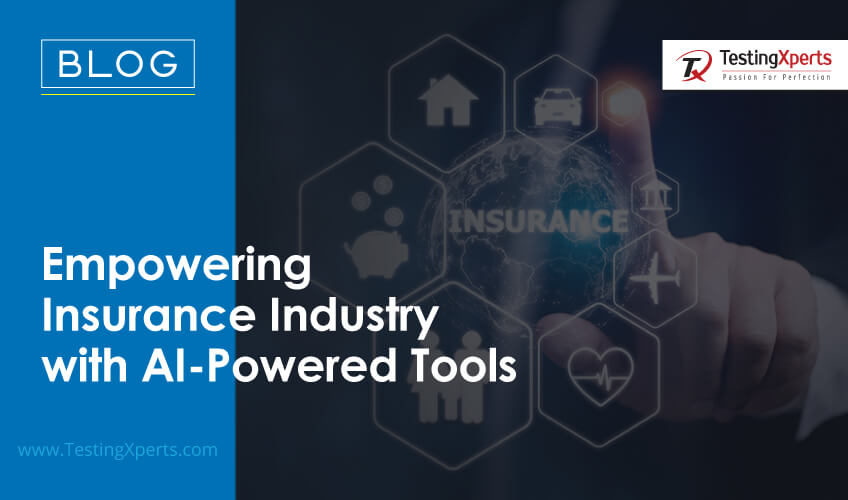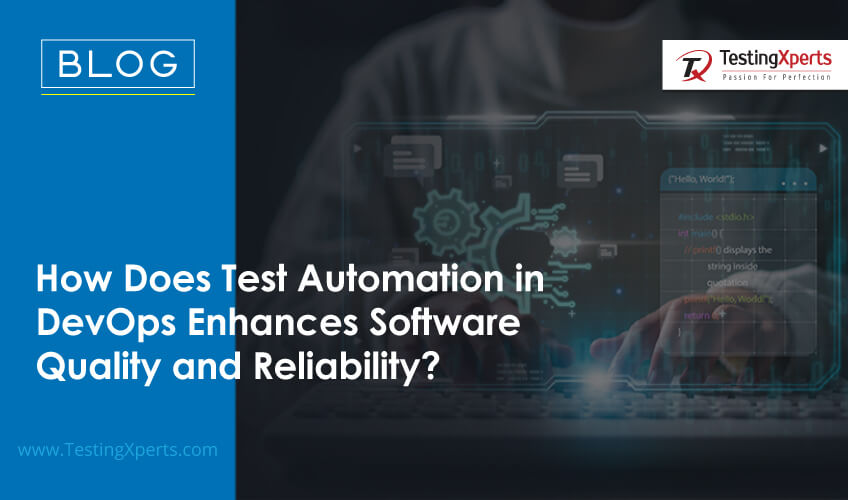
AI and ML in automation have led to a 40% average increase in operational efficiency across various industries. From fitness trackers utilizing AI to enhance training, to smart home assistants simplifying daily tasks, and apps suggesting personalized recommendations for shoppers, their influence is pervasive. We’ve witnessed streaming platforms tailoring music and movie recommendations based on user data, and automation testing tools optimizing test procedures. These technologies are ubiquitous, transforming the way we interact with the world around us.
Machine Learning revolves around crafting algorithms designed to aid by leveraging collections of instances of certain phenomena. These instances can originate from various sources, including natural occurrences, human-crafted datasets, or even generation by other software, all without the need for explicit, rule-based programming.
AI and ML in Automation – Transforming the Industry

The progress in testing has been impressive, transitioning from traditional functional testing to Automation Testing, where Selenium emerged as a widely accepted automation tool. However, in the present-day tech environment, the field of software testing has to embrace innovative testing approaches. In response, the introduction of AI-based testing tools has had a profound and far-reaching impact.
Furthermore, organizations are actively seeking tools that can harness the capabilities of AI and ML algorithms to enhance the efficiency of Test Automation. There is a growing recognition that businesses derive substantial advantages from AI-powered automation testing. This approach facilitates expedited and continuous testing, near-complete automation, and accelerated return on investment (ROI).
AI and ML have the potential to be seamlessly integrated into automated software testing procedures, elevating the competence, dependability, and efficiency of test scripts. However, businesses encounter numerous obstacles linked to conventional automation testing techniques. To address these challenges, AI-driven automation tools can serve as valuable solutions.
How is AI helping Reshape the Automation Industry?

Time:
Each time a new test automation project is initiated, testing teams find themselves rewriting a significant amount of code, regardless of the reusability of components. This repetitive process can be time-consuming, whether it involves implementing a new tool or adapting the existing company framework. AI tools offer a solution by enabling the rapid and automated generation of test scripts.
Changes:
Product teams often make modifications to applications, even if these changes are subtle or imperceptible to users. Such alterations can lead to the failure of test scripts when performing certain actions on the page. AI/ML tools can effectively employ auto-healing techniques to navigate these adjustments and ensure the uninterrupted and error-free execution of test scripts.
Test Script Coverage:
In Agile projects, running the complete regression suite of test cases after every modification may not be a viable option. Nonetheless, AI/ML tools can assist testers in constructing and configuring regression test suites specifically tailored to the particular alterations, taking into account various project parameters and discrepancies.
7 Ways to use AI and ML in Test Automation

Test automation is one of the QA testing areas where AI and ML have significantly impacted. Integrating these advanced technologies has transformed how businesses perceive, plan, and execute tests. Let’s look into some compelling ways of using AI and ML in test automation:
Predictive Analysis:
AI and ML in test automation use algorithms to predict potential problem areas in software by analyzing past test data. This predictive capability allows test engineers to proactively address areas vulnerable to faults, improving software quality.
Intelligent Test Generation:
AI-powered automated testing tools generate and prioritize test cases based on user activity. This approach ensures critical paths and functions undergo thorough testing, reducing manual effort and ensuring robust software applications.
Visual Validation Testing:
AI and ML in test automation enable comprehensive comparisons of images/screens across different browsers and devices. The system detects minor UI discrepancies, ensuring a consistent user experience across platforms.
Optimized Test Maintenance:
As software evolves, test cases often require updates. AI identifies changes in the application and suggests necessary modifications to the test scripts, streamlining maintenance.
Enhanced Test Coverage:
AI and ML algorithms analyze vast amounts of data from test runs to identify testing gaps. This data-driven approach ensures comprehensive test coverage and reduces potential risks.
Adaptive Continuous Testing:
In Continuous Integration and Continuous Deployment (CI/CD), AI and ML algorithms adapt and prioritize tests according to code changes, ensuring recent code alterations receive instant validation.
Natural Language Processing in Test:
AI-powered testing tools with NLP capabilities understand test requirements in plain English, making it feasible for non-technical stakeholders to draft test scenarios.
AI-Powered Test Automation Tools

When employing rudimentary automated testing, individuals like developers, testers, or SDET might rely on code that produces random inputs for various fields. Nevertheless, a significant portion of these tests often become redundant or fail to align with the application’s intended business use. In such scenarios, manually crafted tests prove more valuable since developers possess a deeper understanding of the accurate business flow and usage requirements.
Incorporating AI presents a remarkable prospect for elevating automated testing to align seamlessly with business logic. For instance, users typically add an item to their online shopping cart before being directed to a page where they input their address. Traditional testing often involves checking an API with a static address, but with AI/ML automated testing, it becomes possible to generate a dynamic array of input values that not only adhere to logic but also encompass a more comprehensive evaluation of the applications, leading to more assured and robust outcomes.
This testing approach represents an advanced software testing method that seamlessly incorporates AI, ML, and DL technologies into the realm of automation testing. Its objective is to enhance software quality and accelerate the software delivery process. If you’re eager to harness the potential of AI and ML for robust automation, I wholeheartedly recommend giving ACCELQ a try.
Functional Virtualization and Reconciliation:
Assisting in-sprint automation to synchronize with CI/CD and advancing the practice of shifting left in test automation.
Element handling and bot healing:
Picture your test automation with durability and minimal upkeep. With Bot healing at your disposal, dynamic elements can be consistently identified, putting an end to unreliable or inconsistent tests.
Auto-generation of Test Cases:
Visualize achieving optimal test coverage through the scientific identification of permutations and flows in real-time. This becomes achievable with the automatic generation of test cases, ensuring the most comprehensive test coverage.
Test Data Generator using synthetic data generation:
Synthetic data finds applications across diverse use cases, serving purposes in both functional and non-functional testing. Additionally, it can be harnessed for implementing the data-driven approach effectively.
Conclusion
As leaders in the realm of digital assurance, it is essential for us to continually acquire knowledge and adjust to the evolving landscape of technologies and business methodologies in today’s dynamic world. Moreover, it’s imperative that we familiarize ourselves with cutting-edge AI-based tools and acquire the requisite skills to enhance our productivity and achieve success.
How Can TestingXperts help you with AI and ML Automation?

• With our proven AI testing processes and in-house automation accelerators, we significantly reduce testing timelines, aiding you in achieving faster time-to-market for your AI-driven applications.
• TestingXperts has developed proprietary automation accelerators, such as AI-driven test data generators and pre-built automation frameworks, ensuring robust and resilient AI test automation.
• We focus on rigorous testing to uncover potential risks early in the development lifecycle, thus enabling proactive risk mitigation strategies and ensuring a robust AI solution.
• Over 40% reduction in regression testing time achieved through AI-based test automation.
• 95%+ accuracy in AI algorithm validation using our specialized AI testing methodologies.
• 30% faster time-to-market for AI-powered applications with our agile AI testing frameworks.
Discover more
Get in Touch
Stay Updated
Subscribe for more info




